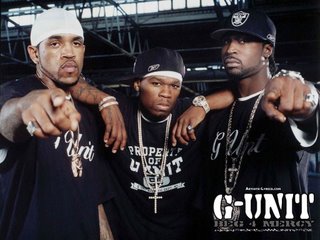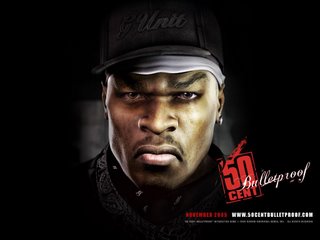Monday, March 23, 2009
By Byron Lee
It all began when I was a kid.
I would set the VCR before church. Anticipation mounted, when the service ended. When I returned home, I would race downstairs to watch the installment of "Wrestling At The Chase" that was waiting for me.
To this day, pro-wrestling brings out the kid in me. Seeing performers execute incredible moves and deliver rousing speeches still entertains me like nothing else can.
It's rare that I talk about my fandom with anyone outside of the fanbase, due to the criticism that predictably comes. "You know it's fake, don't you?" people always ask. Yes, I do know that the matches are not contests, that they are predetermined and choreographed. It is for this reason that wrestling continues to amaze me. Despite the fact that I know it's an act, a storyline, when done well, can still pull me in. (As a St. Louisian, I am especially proud, as our fair city was once home of the National Wrestling Alliance, which was, until the early 80's , one of the premier promotions in the business.)
 RESPECT, AT LAST: The critically-acclaimed Mickey Rourke vehicle "The Wrestler" finally had the mainstream talking about pro-wrestling in a positive light.
RESPECT, AT LAST: The critically-acclaimed Mickey Rourke vehicle "The Wrestler" finally had the mainstream talking about pro-wrestling in a positive light.As a supporter of the industry, my pride swelled as the film "The Wrestler" started to generate a buzz. Thanks to a story that, like "Rocky" before it, used the ultramasculine lockeroom world as a backdrop for an emotional story of redemption, the mainstream was starting to talk about pro-wrestling in a positive light. This occurrence was especially welcome after the feeding frenzy during the aftermath of the death of Eddie Guerrero and the murder-suicide committed by Chris Benoit.

DOUBLE DOWNER: The deaths of Chris Benoit (left) and Eddie Guerrero made for dark days for wrestling fans.
The bubble was burst, a few weeks ago, when it was reported that former WWE star Andrew "Test" Martin, 33, was discovered dead in his apartment, with no evidence of foul play (At press time, the cause of death had not been determined. Given the (sadly vast) history of pro-wrestling deaths, it has been speculated that abuse of performance enhancers, painkillers, sleep agents, or muscle relaxers (or any combination of any of the above) played a role.)
 ANOTHER LIFE LOST: The name of former WWE star Andrew "Test" Martin was recently added to the long list of wrestlers whose lives ended too early.
ANOTHER LIFE LOST: The name of former WWE star Andrew "Test" Martin was recently added to the long list of wrestlers whose lives ended too early.This event is depressing not just because of the loss if life but because of the societal reaction. This tragedy is another excuse for the mainstream media to look at the industry (especially wrestling fans) with its nose in the air. Furthermore, World Wrestling Entertainment has predictably started to cover its hindquarters. Jim Ross, a revered announcer for the company, posted an acknowledgment of Martin's death on his blog that, for all of its heartwarming packaging, seemed to have the following as its underlying point: "He had not worked for us for two years, he had personal problems, and he was going through rehab on our dime. It's not our fault! It's not our fault! It's not our fault!"
More disheartening than the reaction is the seeming inevitability of more deaths like it. Many WWE performers work and travel several days a week, year round. Shortening the weekly workload (and, thus, decreasing the toll taken on the body) would lessen the likelihood of chemical dependency by eliminating the fear many ailing top-tier wrestlers have of losing their spot in the pecking order. Furthermore, the de-emphasis of the "chiseled monster" look that WWE chairman Vince McMahon seems to favor would be a major step in the right direction. (It's an unspoken fact that McMahon doesn't like to promote performers would could look like someone's next door neighbor.)
The reality, however, is that WWE, like any other business, is looking to maximize profit. This fact makes the aforementioned remedies unattainable.
Don't get me wrong. Every Monday, I will be watching Monday Night Raw, and every time WWE comes to St. Louis, I will be in attendance, having a ball.
Wrestling brings out the kid in me, which makes it all the more painful, every time I have to grow up.
Saturday, February 28, 2009
It was all
In front of me.
Now, it's gone.
The fruit born of your mind was
Mine for the taking, but I was
Distracted. Thorns from brittle branches
Cut deep. Ants, given the
Power of bulls, ran roughshod
Through my head.
Forgive me.
For running from the
Passion that pulled me in. For stepping
Back from the table with my cards
Held to my chest. For wanting a tailor-made fit, when your
Off-the-rack ways suited me
Just fine.
I haven't been banished, but
I 'm not where I
Want to be.
All is clear when viewed
through misty eyes.
Tuesday, November 25, 2008

Album Review: Kanye West's 808s & Heartbreak
808s & Heartbreak finds Kanye West moving in a new sonic direction, and it works best when the songs are crafted into concise, (relatively) subtle statements. "Welcome To Heartbreak," finds the Louis Vuitton Don poignantly expressing regret over the sacrifices he's made to get to where he is.
Dad cracks a joke. All the kids laugh.
What I couldn't have, way up in First Class.
Chased the good life, all my life long.
Look back at my life, and my life gone.
Where did I go wrong?
Also providing insight is "Heartless," where West gives you a view into the end of a relationship. A headnodding beat gives the song the feel of an inverse of "Golddigger," with hurt and tension replacing the one-liners.
How could be so Dr. Evil?
You bringin' out a side of me that I don’t know.
I decided we weren't gon' speak, so
Why we up 3 A.M. on the phone?
Why does she be so mad at me fo'?
Homie, I dont know, she's hot and cold.
I won't stop, I won't mess my groove up
'Cause I already know how this thing go.
The proceedings perk up with "Amazing." Utilizing minor key piano chords that call to mind some of Eminem's production work, the song marks the return of the braggadocious Kanye of old.
It's amazing, I'm the reason
Everybody fired up this evening.
I'm exhausted, barely breathing.
Holding on to what I believe in.
No matter what, you'll never take that from me.
My reign is as far as your eyes can see.
Although the guest appearance of Young Jeezy could be read as a concession to the streets, he infuses the track with an energy that is palpable.
They like 'Oh god!
Why you go so hard?'
Look what he's been through.
He deserves an applause.
Although these tracks work well, a Kanye fan would probably think that there is an element that is missing: humor. Well, "Robocop" remedies that problem. On a track complete with machine noises that mimic the ones used in movies whenever robots walk slowly, West uses wit to convey the anger and terror that accompany a relationship with someone who, in his view, was overly controlling.
About the baddest girl I ever seen.
Straight up outta movie scene.
Who knew she was a drama queen?
Thatll turn my life to Stephen King’s.
Up late night, like she on patrol.
Checking everything, like I'm on parole.
Having the most impact, however, is “Pinocchio’s Story,” where Kanye sings a freestyle in concert. He uses the wish of the titular character ("I wanna be a real boy.") to frame a searing look into the dehumanizing side effect of fame.
What does it feel like to live life, to be real,
Not some facade on tv that no can really feel?
Do you really have the stamina
For everybody that sees you and say 'where's my camera’?
For everybody that sees you and says 'sign my autograph'?
For everybody that sees you and says that 'you all that'?
Unfortunately, there are many other moments on this recording when I wished that someone would have dissuaded Kanye from following through on his impulses. "Paranoid" sounds like a more extreme version of Pharrell's "Number One." Imagine the St. Elsewhere theme song, as interpreted by early-period Prince, with a sing along chorus attached to it. It's such a mess that I couldn't help but be amused by its audacity. Furthermore, album-opener "Say You Will" has tearjerking chords and laidback trip-hop percussion, but is ultimately undone by processed crooning, a lack of direction (You'll never hear the saying "Hey, hey, hey" in the same way, again.), and its mind numbing (for a pop song) length. Likewise, "Love Lockdown," the abysmal choice for first single, begins intriguingly with a sparse bassline and haunting lyrics, but the treatment of the vocals and the galloping drums on the chorus create a wall of noise that obscures the song. You wonder what the result would have been, if the production had more restraint and if the arrangement was performed by someone who could legitimately belt out a tune.
"Say You Will" and "Love Lockdown" exemplify a major problem with the album: many of these songs start off promisingly, but are ultimately aimless, with Kanye saying the same lines, ad nauseum. Rarely has the line between catchy and resonant, with regard to the work of a critically-heralded artist, been so distinctive. Frankly, some of the tracks, among them "Coldest Winter," West's dedication to his dearly departed mother, sound unfinished. (This occurrence leads me to believe that Island Def Jam was determined to have another big, fourth quarter release (along with Ludacris's), in order to improve their bottom line for the year, especially in light of Jay-Z's album being pushed back.) (At the risk of incurring the wrath of my readers, I will also point out that one of the lackluster tracks, "See You In My Nightmares," is nearly saved by a fellow Auto-tune convert: Weezy F. Baby.) Making matters worse is that, even on the better songs, Auto-tunes's occasional off-key warble is off-putting.
Groundbreaking artists make missteps. Now that West has gotten 808s & Heartbreak out of his system, here's hoping that he regains his footing.
Bottom Line: 808s & Heartbreak is a mixed bag. When it's focused, it's an insightful, captivating look into loss, regret, and resentment. The collection is marred, however, by self-indulgence, and, ironically, a feeling of incompletion.
Rating: 6.0/10
Track Listing:
1. "Say You Will"
2. "Welcome to Heartbreak" (feat. Kid Cudi)
3. "Heartless"
4. "Amazing" (feat. Young Jeezy)
5. "Love Lockdown"
6. "Paranoid" (feat. Mr Hudson)
7. "RoboCop"
8. "Street Lights"
9. "Bad News"
10. "See You In My Nightmares" (feat. Lil Wayne)
11. "Coldest Winter"
12. "Pinocchio Story" (freestyle live from Singapore) (bonus)

Album Review: Taylor Swift, Fearless
Country star Taylor Swift's follow-up to her 2006 eponymous debut begins, tellingly, with the title track, a subtle, yet solid number that serves as a thesis statement for the album, as a title track should. In this case, the song uses love to implicitly urge the willful abandonment of inhibitions in order to embrace the pleasures of life.
and I don't know how it gets better than this
you take my hand and drag me headfirst
Fearless
and I don't know why but with youI'd dance
in a storm in my best dress
Fearless
On "Fifteen," the album standout, Swift poignantly takes the listener through the milestones of early life (the first day of high school, the first kiss, a devastating break up), while singing from the point of view of an older woman speaking to a girl of the titular age.
when all you wanted
was to be wanted
wish you could go back
and tell yourself
what you know now
Making the song more powerful is the use of personal lyrics to transcend trappings of a pop artist.
back then I swore I was gonna
marry him someday
but I realized some bigger dreams of mine
and Abigail gave everything she had to a boy
who changed his mind
and we both cried
In the liner notes, in the center of the lyrics for "Fifteen," is a picture of the singer with the Abigail she sings of.
The next track, "Love Story," (the first single) uses a toe-tapping tempo and Swift's soaring voice to bolster its trite Romeo and Juliet references. It is at these moments that, despite the pop sheen put on the material, Swift shows herself to be the star of her album. It's a testament to both her personality and her vocals (which alternate from a girl's tantrum to a woman's yearning)) that she is able to bring distinction to the rather routine girl-wants-boy/girl-is-disappointed-by-boy/girl wish-fulfillment scenarios in many of the songs found here.
What is also noteworthy is how well the collection functions as a transitional album. Some songs address teenage angst (the person you like likes someone else, people in school are mean, etc.), while others depict love in a much more general way, all the better to prepare Swift's audience for the grown up songs Swift, who receives either full, or partial, songwriting credit for every song on the disc, will soon be singing.
Making Swift's evolution less risky is the CD's sonic packaging. Fearless has the same mixture of poignancy, spunk, and sweetness that was found on her last album, but all parties involved have upped the ante. This music is being engineered to sell to as many people as possible, and no part of the formula (the violin flourishes, the guitar riffs that build during the verses to overpower the listener on the choruses) is overlooked. Every sonic touch is introduced exactly when you expect it to be. (Even the sequencing of the songs, which, at times, reflects the ups and downs of a relationship, is done for maximum effect.) Oddly enough, this aspect is most noticeable when the album threatens to go off the beaten path. The intro to "Tell Me Why" sounds like bluegrass hip-hop, but then it deftly segues into the song proper. It's a remarkably smooth shift that could only be executed by people who know what they're doing. (It should also be said that it's not just the production that is slick. The CD jacket has a colorful, meticulously-designed format that incorporates a lyric sheet and photos that look like theme shoots from America's Next Top Model--if you're into that sort of thing. It's a sight to see and almost worth the price of the disc, in and of itself.)
The album hits its home stretch with "The Way I Loved You" (an emphatic number co-written by John Rich) and never lets up. "The Best Day" nearly matches "Fifteen" with Swift recalling how important her family has been to her during her young life. In talking about a car trip with her mother, after a day of being bullied, she sings
I don't know who I'm gonna talk to now at school
but I know I'm laughing on the car ride home with you
don't know how long it's gonna take to feel ok
but I know I had the best day with you today
She also vividly depicts her childhood connection with her father, when singing
there is a video I found from back when I was three
you set up a paint set in the kitchen and you're talking to me
it's the age of princesses and pirate ships and the seven dwarfs
daddy's smart and you're the prettiest lady in the whole wide world
It's a vivid and heartfelt song that will make people think of the moments when they felt the most affection for loved ones. The album concludes with the Olympics-commissioned, yet suddenly timely, "Change," an obligatory, hope-for-a-better-day song that, true to form, is delivered with enough authority to overcome its familiarity.
Bottom Line: Pop country isn't for everyone, but, if you give it a chance, Fearless will most likely win you over with its charismatic star, powerful lyrics, and glossy production. It left me excited to hear what Taylor Swift will offer next.
Rating: 8.5/10
Track Listing:
1. "Fearless"
2. "Fifteen"
3. "Love Story"
4. "Hey Stephen"
5. "White Horse"
6. "You Belong With Me"
7. "Breathe"
8. "Tell Me Why"
9. "You're Not Sorry"
10. "The Way I Loved You"
11. "Forever & Always"
12. "The Best Day"
13. "Change"
Sunday, October 19, 2008

Levi Stubbs (of The Four Tops)
June 6, 1936 – October 17, 2008
http://en.wikipedia.org/wiki/Levi_Stubbs
http://blog.allmusic.com/2008/10/17/rip-levi-stubbs-of-the-four-tops/
http://www.allmusic.com/cg/amg.dll?p=amg&sql=11:3ifpxqe5ldke~T1
Tuesday, May 22, 2007
Handsome looks, a winning personality, charisma, passion, and smart decision making. Will Smith has utilized all of these attributes to reinvent himself from rapper to personality to box office attraction to respected actor.
In this issue of the Limelight, we will trace Will Smith's path to superstardom, spotlighting how his attributes have paved the way for his success.
 Just the four of us: Three Generations of Big Willies...
Just the four of us: Three Generations of Big Willies...Born on September 25, 1968 in West Philadelphia, the second of four children, Smith was told about the perils of not working hard and shown the rewards that come with a strong work ethic. In a testament to the values of his upbringing, the family unit remained tight even after Will's parents (His father installed refrigerators; His mother worked on a school board) divorced when he was 13.
Smith kept his nose to the grindstone in and out of the classroom. Smith was so charming in interactions with both students and faculty that he received the nickname "Prince." Smith worked so hard in the classroom that he was offered a full ride to the Massachusetts Institute of Technology.
However, Young Will, who was surrounded by music as a child, had other plans. He had found a passion for rap music and had started making tracks with DJ legend Jeff Townes, better known as DJ Jazzy Jeff, after meeting Townes at a party. Smith added "Fresh" to the nickname to form the moniker by which he would be known to the world.
 Pioneering Hip Hop Icons DJ Jazzy Jeff & The Fresh Prince
Pioneering Hip Hop Icons DJ Jazzy Jeff & The Fresh PrinceThe duo DJ Jazzy Jeff and The Fresh Prince found much success with their seminal sophomore album, 1988's "He's The DJ, and I'm The Rapper." The song "Parents Just Don't Understand," a great example of the group's combination of humorous lyrics and funky beats, became a staple on music video stations and went on to win the first "Best Rap Performance" Grammy. Their next recording, 1989's "...And In This Corner" maintained their success, with the smash hit "I Think I Can Beat Mike Tyson."
The duo, like contemporaries such as Young MC and Tone Loc, were accused by some of watering down the street edge of rap music. Their name became a punchline in some circles.
The criticism would only grow louder when, after making a connection with record executive Benny Medina at a television special, Smith agreed to star in a half-hour sitcom starring a character based on Medina who relocates to Beverly Hills to live with rich relatives.

 Making Television History...
Making Television History..."The Fresh Prince Of Bel Air" began airing on NBC in September of 1990 and was criticized by some for rehashing what some people viewed as tired stereotypes of the black bourgeoisie. Yet, thanks to a talented supporting cast, particularly James Avery as Uncle Phil and Alfonso Ribeiro as Carlton Banks, the show ingratiated itself to viewers. The show was so popular that a letter writing campaign convinced Smith to come back to the show after it's third season, even though he had planned to focus more on film and music; the show ended up running for three more seasons.
While his acting career was blossoming, he also kept himself grounded in his first love. 1991's "Homebase" featured the laid back, Kool and the Gang-sampling seasonal anthem "Summertime," which became the group's biggest hit to date. "Homebase" eventually went platinum.
 Flipping The Script On The Homosexual Tip...
Flipping The Script On The Homosexual Tip...Ever looking for a challenge, Smith made it clear that he was committed to becoming better as an actor by appearing in a variety of roles. He made his big screen debut as a homeless paraplegic in the gritty ensemble piece "Where The Day Takes You." His next silver screen appearance, as a gay hustler in the 1993 film adaptation of the play "Six Degrees of Separation," was especially noteworthy. Although criticized for not committing to a gay kiss, Smith was praised for his nuanced portrayal. This role established that Will could play someone other than himself, silencing some of his detractors.
 Bad Boys With Guns Will Travel..All The Way To The $Bank$...
Bad Boys With Guns Will Travel..All The Way To The $Bank$...His big breakthrough would come when he and fellow black sitcom star Martin Lawrence became aware of an action/comedy film project that had been abandoned by Saturday Night Live vets Jon Lovitz and Dana Carvey. The project was "Bad Boys." The witty report of Lawrence and Smith, the visual assault of director Michael Bay and the popcorn movie aesthetic of the production team of Don Simpson and Jerry Bruckheimer, catapulted the film, budgeted at $20 Million, to a 65 million gross.
Will Smith All-American Hero:
"Independence Day"

"Bad Boys" began a string of hits (including "Independence Day" and "Men In Black") that made it clear to Hollywood that it wasn't just the action-packed set pieces that packed movie houses; it was Smith that brought people to the theater in droves.
Having achieved success in Hollywood, Will felt the itch to return to music. Initial announcements of this decision were met with skepticism, with fans worried that Smith was yet another performer who did not know when to hang it up. Deciding to perform under his given name, Smith released "Big Willie Style" in late 1997. Powered by the mass appeal of the Sister Sledge-sampling "Gettin' Jiggy With It" (a song that added a new word to the American lexicon), "Big Willie Style" went 10 times platinum.


At Last: Will And Jada
At this time, Smith also found happiness in his personal life. Smith, who had been divorced for two years from Sheree Smith (the relationship bore one child, Trey), started dating actress Jada Pinkett, best known for her roles on the television program "A Different World" and films such as "Set It Off" and "Jason's Lyric." The two married in December of 1997 and have two children together, Jaden and Willow. Will and Jada have become one of Hollywood's most popular couples because, despite having achieved great fame and wealth, they have a genuine approachability that has endured them to people of all races and classes. Will had attributed the strength of their marriage to being focused on, and dedicated to, each other. Said Smith in a 2005 People Magazine interview, "When you know what you want, where you're going, what you're doing, [the pressure of being a couple in the spotlight] becomes less difficult to manage. That's why we work."
 It's Been A Long Time...Will Smith Repping On The Mic...
It's Been A Long Time...Will Smith Repping On The Mic...Even at the pinnacle of his professional and personal lives, accusations of being soft still dogged him. Even Eminem, someone who was, at the time, struggling to gain credibility in the rap community, felt comfortable going after Will in some admittedly funny bits during Dr. Dre's "Forgot About Dre" video and Shady's own mega hit "The Real Slim Shady." Smith has stayed true to himself, though, repeatedly stating that he has always wanted to make music "that my mother could listen to." (It was reportedly for this reason that Smith declined to figuratively "drop the bomb" on Eminem when Smith released the impressive CD "Lost and Found" in 2005.)
Having gained invaluable acting experience, Will now felt comfortable taking on the role of a lifetime, that of boxing legend and cultural icon Muhammad Ali. Smith trained physically and mentally for the part, gaining 35 pounds of muscle to match Ali's fighting weight.
Although "Ali" received mixed reviews, with many critics finding the movie to be bloated and unfocused, Smith was praised for showing Ali's depth, for refraining from doing an impersonation, and for having great chemistry with co-star Jon Voight, who portrayed Howard Cosell. Smith earned a Oscar nomination for his effort. (On the set of this movie, Will's work ethic would rub off on someone else: Smith helped Jamie Foxx get the role of Ali cornerman Bundini Brown in "Ali", and Foxx credits Smith with forcing him to be disciplined about his approach to playing Ray Charles.)

"Will Smith Is $Money In The Bank$: "Hitch" Made Box Office History..."
After filming successful, if perfunctory, sequels to "Bad Boys" and "Men In Black," Smith appeared as relationship coach Alex Hitchens in the comedy "Hitch." The film garnered praise for having more smarts than the average romantic comedy, and accolades for chemistry between Smith and sitcom star Kevin James. Released the weekend before Valentine's Day 2005, the film set the record for the highest weekend opening for a romantic comedy ($43 million) and went on to gross nearly $180 million.
Smith showed how far he had come, with regard to appeal, with "The Pursuit of Happyness," a loose adaptation of the life of Chris Gardner, a man who rose from homelessness to become a successful stock trader. While some critics found the film's trajectory overly familiar and difficult to sit through, Will was praised for his chemistry with son Jaden, who was cast as Gardner's son. The film became Smith's 6th number one debut in a row and, at press time, has grossed $160 million domestically. The film also garnered Smith his second Best Actor Oscar nomination. The fact that he took a story largely unknown to mainstream audiences (and chose director Gabriele Muccino, a filmmaker unknown to U.S. audiences, to helm the project) proves that he has cultivated enough good will with North American audiences that he can now get a film made and sold to audiences merely by attaching his name to it.
Although he has come a long way since "The Fresh Prince of Bel Air," perhaps a quote from a 1990 interview with Vanity Fair best encapsulates his approach to life:
Will Smith has trusted his instincts, made his way to the top, and maintained his position. Hollywood, and our community, are much better for it.

HISTORY MAKER-In every facet of her life (her schooling, her tenure at Stanford, her political service) Condoleezza Rice, our 66th Secretary of State, has stood out. The guidance of proud, progressive parents has taken the Birmingham, Alabama native very far.
A Limelight Exclusive
By Byron Lee
She is one of the most controversial figures in our community, the significance of her achievements overshadowed by her allegiance to a faltering, misguided regime. In this issue of the limelight, we explore the background of Secretary of State Condoleezza Rice.
Born on Nov. 14, 1954 in Birmingham, Alabama, her father John, a pastor, and her mother Angelena, an organist and science teacher, instilled in Condoleezza (named after the Italian musical expression con dolcezza ("with sweetness")) both the idea that she was special and the idea that she would have to work much harder than others to ensure success..
Her parents took what may seem to some blacks as controversial measures en route to having the young girl fight oppression. Instead of getting involved in the marches of the time, The Rices, like many parents in Birmingham's black middle class Titusville subdivision, opted to take the child directly home from school, immersing Condi in a regimented schedule of school work and extracurricular activities. John Rice is said to have taken this approach in order to prepare his children for the future, saying to them, "Things will not always be this way." As Rice stated in a 1993 interview with the Chicago Tribune, "I remember it as a time when...my parents had to try to explain why we had to drive all the way to Washington D.C., before we could stay in a hotel. And they had to explain why I could not have a hamburger in a restaurant but I could be president anyway, which was the way they chose to handle the situation." (An additional, more visceral reminder of racism occurred on September 15, 1963, when four girls were killed in the bombing of the 16th Street Baptist Church, just down the street from John Rice's church. One of the girls killed was Denise McNair, a classmate of Rice's.)
In addition to helping their only daughter, The Rices were extremely progressive for their time. John organized college fairs through his church at a time when very few blacks considered college as an option. Furthermore, when Condi enrolled in school, her mother, dissatisfied with the second-hand books being used at the school, bought new textbooks for Condi's class. Condi sped through these books (she is still a speed reader today) and was soon tutoring her classmates.
In addition to classwork, Rice found another passion growing up: the piano. Her grandmother, tired of hearing the young girl bang on the keys, decided to teach her how to play. (Condoleezza claims that she learned how to read music before she learned how to read; She continues to play the piano to this day and, years later, astounded a piano teacher at Stanford with both her dedication and memorization skills.)
Rice skipped both the first and seventh grades and graduated from high school at the age of 15. She enrolled in Denver's Lamont School of Music (her father had become vice chancellor at the University of Denver and moved the family to Colorado during Condi's high school years). She felt intimidated by her classmates and changed her major to political science after taking an international politics course taught by Josef Korbel, the father of future Secretary of State Madeline Albright. The Washingtonian reports that, when her father warned her that, "Blacks don't make money in political science." Condi casually responded "Music either."

FOR THE BOYS (AND GIRLS)-Condoleezza Rice, along with other members of the Cabinet, greet our troops. Ms. Rice’s accomplishments have caused her to receive several e-mails and letters daily from young girls looking for inspiration.
Condoleezza became fascinated with Soviet politics and culture. She received a bachelors in International Relations in 1974, earned her masters in Economics at Notre Dame and earned her PhD in International Studies, with an emphasis in Soviet studies, in 1981 from the University of Stanford. This same year, she was awarded a fellowship and became an assistant professor of political science at the university. She was the only black woman on the faculty. (It was during her extensive studies that Rice had a political conversion; She voted for Jimmy Carter in 1976, but was disillusioned by Carter's handling of the Soviet invasion of Afghanistan.)
Rice would see a change in scenery when former national security adviser Brent Scowcroft, remembering the way Rice discussed foreign policy at a dinner several years earlier, drafts her for several positions in the George H.W. Bush Administration, many concerning Soviet, European and national security affairs. She serves for an historical three years (during which the Berlin Wall fell, Germany became one once more, and Russia became a supporter of the U.S. in the Persian Gulf War) and returns to Stanford with a telling observation: "You go to Washington with whatever knowledge you have, and then you burn it down. The problem is that sometimes people stay beyond the time that they have any intellectual capital left," she told the Washingtonian.
Rice was chosen as Stanford University's Provost (chief financial and academic officer) in 1993, the youngest in the school's history. Her tenure is widely remembered for various reasons. She started a program to help eradicate the school's deficit and balance the institution's budget. She also earned practice being loyal to a polarizing figure, in this case university president Gerhard Casper. She was also derided for restructuring the undergraduate program, chiefly with regard to the multicultural studies component. (The situation came to a head with the dismissal of a popular chicana studies professor, which led some students to go on a hunger strike; She finally decided on an "Introduction to Humanities" curriculum that would incorporate the history of many cultures into the core of american history.) In support of the unification of the history program, Rice stated in an interview that, "If you're going to read and understand Frederick Douglass, then you'd better understand Thomas Jefferson, because that is who he was referencing."

BEST FACE FORWARD-Some say that Ms. Rice’s presence in the Cabinet has added a much needed humanity to our current administration.
George H.W. Bush, having struck a rapport with Rice during her time in his administration, invited her to Kennebunkport, Maine in 1998 to be George W. Bush's foreign policy coach. Rice and the younger Bush hit it off over sports and fishing. She joined Bush's campaign and became national security adviser after the 2000 election. (According to the Washingtonian, John Rice, in the hospital with stokelike symptoms, saw his daughter sworn in via television; he died six days later on Christmas Eve. (Her mother Angelena died in 1984.)

GRACE UNDER FIRE-While Rice has drawn criticism for her allegiance to the stances of The Bush Administration, she has been lauded for her poise under pressure.

FUTURE IN THE AIR-Rice, a football fanatic, has toyed with the idea of being NFL Commissioner, once her time in the Presidential Cabinet is up. Others say that she will move back west, due to her personal and professional roots there.

NewsMaker And NewsMan- Condi with George Curry.
Wherever she goes, and whatever we think of her allegiances, Condoleezza Rice is someone who has, and will continue to, leave her mark on history.
http://byron-lee.blogspot.com/
By Byron Lee
"The real record I have set for over 50 years is the fact that I have had one job and one wife."

A LASTING LOVE-Eddie with Doris, his wife of 67 years.
This quote perfectly encapsulates the philosophy of late coaching legend Eddie Robinson. The statement, referenced in a recent retrospective article by the Associated Press, has clear implications of passion and loyalty that no doubt were the foundation of his legacy.
He is one of the most victorious coaches in college football history. He gained immense respect from those outside of his community. For this edition of the limelight, we will profile former Grambling Football Coach Eddie Robinson.
As he grew up, Robinson, born February 12, 1919 in Jackson Louisiana, became known as someone who would put his nose to the grindstone. Raised by a sharecropper dad and a domestic worker mom who divorced when he was ten, he credited his maternal grandfather for instilling that value in him. During his youth in Baton Rouge, he worked as a shoe shiner and as a newspaper distributor.
Even before his high school years, Eddie believed that he had found his calling. He would watch the McKinley High School Football team practice under coach Julius Kraft. "I saw the way they were calling him 'sir' and 'coach,' the way he built his players up," Robinson said in a 1985 interview with the New York Times. "And he had a mean streak in him. He'd smile, then he'd stop smiling and you knew it was time to win. I was drawn to that."

IN COMMAND-Robinson surveys the field.
He was a star player a few years later, when he attended McKinley, and he was equally impressive at Leland College (which was later incorporated into Southern University.) During his time at Leland, Robinson came closer to his dream when Baptist preacher Reuben Turner, Robinson’s coach, familiarized the young man with the act of calling plays.
After graduation, Robinson got married. Soon to be a father, he worked in a feed mill and on an ice wagon to make ends meet. "He was always working," said Doris, his wife of 67 years, "and he was so serious…about everything he did."
In addition to all of his hard work, a connection, a chance at opportunity, was essential in Robinson getting the job that would change his life forever. "My wife Doris's sister knew the family of the Grambling president, Dr. Ralph W. E. Jones," he told Sports Illustrated in 1985. "That's how I got to meet him, and that's how I got the job.” Robinson showed the gratitude of a man wise enough to know that no one truly makes it without the help of others. “I don't know what would have happened to me if Dr. Jones hadn't hired me," he continued. "That man made more of an impact on me than anyone except my father."
Coach Robinson had to do much more than coach football in the beginning; he presided over the school's athletic department, tended to the football field, and even coached Grambling's basketball team.
During WWII, Robinson, like many coaches, experienced a phenomenon that could have wrecked many programs: he lost many players to military service. Instead of letting the program, and himself, lie dormant, he coached the Grambling High School team and won the championship. (He claims that he got the team used to working hard by having them pick cotton for his father.) He also used the rebuilding time wisely, watching black high schools for prospects. When his older players came back from combat and joined the crop of new players, the time was ripe to compete successfully. It is apropos that during this period the team's intuition ceased being the Louisiana Negro Normal and Industrial Institute and became simply, and powerfully, Grambling College.
The program would gain much of its early national coverage through the ascension of running back Paul "Tank" Younger. The team had triumphant seasons during Younger’s time there (1945-1948) and, in 1948, Younger became the first black player from an all-black college to be drafted by an NFL team (The Los Angeles Rams). Other players such as Ernie Ladd, Willie Davis, and James Harris also made it to the pros.

LEADING A POWERHOUSE-Through Robinson's shrewd marketing, Grambling's greatest was recognized by the nation.
The program would continue to thrive during the 50’s, holding their own against respected black college powers and getting more attention after soundly beating Florida A&M in the Orange Blossom Classic following the 1955 season. They were recognized in a major way in 1958, when they were allowed entry into the Southwestern Athletic Conference.
Robinson’s competitors were dumbfounded, mainly due to the fact that the coach used a simple plan of attack. "Eddie doesn't try to fool you," Marino Casem, the head coach at Alcorn State, told the Times in 1985. "He'll run four basic plays and four basic pass patterns. You don't know when they're coming and sometimes when you do, ain't a damn thing you can do about it. He believes in doing it right and doing it over and over and over again."
Wisely realizing that the team's prospects for widespread national attention were limited by its location, Robinson started touring the team in 1968 and kicked publicity for the team into overdrive. The documentary “Grambling College: 100 Yards To Glory” (co-produced by Howard Cosell) was filmed, and the three major networks started giving the team, and their school, exposure. The following year, the team played before nearly 300,000 paying customers in 11 games.

ONLY ONE HOME-Robinson repeatedly stated that he could never leave Grambling.
Robinson seemed especially moved by an occurrence that happened a few years later: the team played a regular season game in the Sugar Bowl in New Orleans. Robinson said that he remembered “when blacks couldn't even sit in the Sugar Bowl."
Wanting some of the coach’s success to rub off on their programs, many southern white schools started showing interest in black players, limiting Robinson’s talent pool. Eddie reacted with the mix of pragmatism and tenacity for which he was known. "The way it is today is the way it should be...Blacks [have] made progress and the only way to do that is to understand the system,” he told the Washington Post in 1983, “The whites put the system together. So adapt to it…Get under the American flag and go to work, boys. Go to work." He has also stated that once he claimed an American identity, he realized that there were "no excuses--no excuses for failure."
The rewards that come with hard work were soon distinctly quantified. Robinson earned his 300th college victory in 1982 and became the winningest coach in college football history in 1985, getting his 324th win against Prairie View. (Robinson remained the most victorious college coach until John Gagliardi of St. John's replaced him in 2003.) The program went on to win nine national black college championships and 17 Southwestern Athletic Conference titles.
Despite the success of his program, Robinson was still all-too-aware of the stereotypes that were still prevalent in society. He spoke to this reality at a luncheon in 1974, saying "Maybe I'm old-fashioned, but I say we do have things to prove. I say we have to prove we're articulate; we have to prove we don't steal towels from hotels; we have to prove we can eat. I just talk from experience. I still know black players who won't eat at hotels because they don't know how to eat."
Robinson had much affection for his players and their institution. This feeling was best exemplified when Robinson was offered an assistant coaching position with the Los Angeles Rams in 1977. Robinson told the Washington Post in 1983, "Money never could buy me happiness. I thought about all those years at Grambling, about my friends here in town and my family and all the hard work I'd put into this school...There was no way I'd leave Grambling. It was always like being at one big picnic."
The program fell on hard times during the mid 90's, with the team winning only 3 wins in Robinson’s final season in 1997 and facing various off-field allegations. Reportedly being influenced by boosters, Grambling relieved Robinson of his duties and replaced him with former pupil, and Super Bowl XXII MVP, Doug Williams. Robinson was informed soon after that he had Alzheimer’s.

A BELOVED FIGURE-Robinson became a cherished presence both on Grambling's campus and in his players' lives.
Robinson ended his 57 year career with a record of 408-165-15. To hear him tell it, the program's success was due to one ingredient. "Coaching is a profession of love," he said,”You can't coach people unless you love them." Everson Walls, who played for Robinson in the 70s and went on to play for the Dallas Cowboys, said, quoted for the Times piece, that they "didn't have the best conditions, and Coach Robinson knew that, but said that, in the long run, this is one of the best things we could go through, because we'd have to face less than ideal situations in the real world." Doug Williams, speaking with the Times, said that Robinson "could build you up and make you feel like you could do anything. He never told us that life was unfair and that we'd have to be ready for it. He always told us that this was America, and we could be anything we wanted to be." Paul Younger told Sport Illustrated in 1983 that, "Because of Eddie's rules and regulations, the average guy you see from Grambling is a pretty good person."
He showed his love for his players by teaching etiquette and helping his players get jobs after graduation; Robinson's players have responded in kind. The players speak of him with great respect and, in his final years, many of them frequently visited him at his home.

IN TWILIGHT-In 1997, Robinson was diagnosed with Alzheimer's.
The public was highly reverential as well. After his death, he was only the fifth person to lie in repose at the Louisiana state capitol.
It is rare that a human being receive such accolades. In this and other ways, Eddie Robinson was a very fortunate man. Judging by the words and actions of his life, he was fully aware of it.
http://byron-lee.blogspot.com/
Tuesday, January 09, 2007

PASSING THE TORCH: Callie Herd with noted historian Dr. John Hope Franklin. To read interesting summary on "the meeting of the minds" please click on the following link:
HELPING OTHERS HELP THEMSELVES: Callie Herds' blog http://www.ctherd.blogspot.com/ has been recognized for connecting people with information regarding scholarships, internships, and jobs.
Callie Herd is a blessed woman who believes in maximizing the quality of life. In speaking, the FedEx Information Technology Specialist repeatedly says that life is more than living "3 scores and 10" (70 years). She was inspired by the example of her World War II veteran father ("Even though he went through a lot of racism and prejudice, he still had that smiling face") and the mother who tirelessly took care of said father (along with Herd's five siblings) when he came back from the war severely disabled.
Her inspiration led her to get actively involved in community service, first through the Memphis Civil Rights Museum (there was a vast need for volunteers in the wake of author Alex Haley's death in 1992) and then through work with the Memphis Food Bank, where her citywide "Hunger Hurts" activities led to an exponential rise in the number of volunteers for the charity.

ANOTHER SUCCESS: Callie Herd with Memphis radio personality Marlon "Nappy" Wilson at Herd's "Why Community Service?" banquet. Please click on the following link to read summary of "Why Community Service?" event:
http://weallbe.blogspot.com/2006/11/why-community-service-event-serves.html
The 2-time FedEx Volunteer of the Year eventually decided to turn her attention to the plight of single parents trying to find scholarship money for their children after she was able to obtain 1 million dollars in scholarships and offers for her own children. "It would not be right for me not to share this information," says Herd, "I am my brother's keeper." Her efforts resulted in the blog http://www.ctherd.blogspot.com/, a blog that has become so well known that it has been mentioned by syndicated writer Stanley Crouch, added to the blog roll of many national websites, and voted as a finalist for "Best Site for Single Parents" by Black Web Awards.
The busy Herd views Christmas as not only a time to relax, but as a time to reflect. "My father passed in August. We usually had Christmas dinner at his house. We're still going to have dinner at his house, and reminisce about the people we have lost and be thankful that we are blessed to still be here."
As for the future, Herd believes that volunteering may provide a silver lining in the overcast skies brought on by the recent Michigan State decision that has gradually scaled back the use of race-based scholarship awards. "[The children] will be looking for volunteer hours, but they will find hope and peace in helping that elderly person who doesn't have someone to read for them, or waiting with that person as they wait for someone to feed them. Our children will learn what it means to give back to their community, and, when they get into college, they can say, 'I'm not a quota, I'm a person, and I got in here because I was just as good as everyone else.'"
Like Ms. Herd, Tedarrell Muhammad also knows the value of giving. The fellow Tennessee native, born to a hard working mother, always had a knack for selling. "I used to cut people's lawns. The housing project I lived in had a lawn cutting service, but they would only cut lawns every three weeks. People in my project wanted their lawns to look clean." His desire to make more money led him to notice the large income his manager at one of his jobs always seemed to pull down. He found out the money came from drug dealing, and he was soon working under his boss.
The fast life came to an end when one of his partners was arrested, and, as a result, Tedarrell was indicted and ended up serving time. While in prison, he made a discovery that changed his life. He heard a recording of a speech made by Minister Louis Farrakhan of the Nation of Islam. "I had never heard anyone speak like that."
The Nation would continue to play a role in his life once he was released. After being disillusioned with his first post-prison work experience, he worked for a plumbing company ("I used to scuba dive into swimming pools and change their pipes.") One day, he unexpectedly walked into a new occupation: "I changed a pipe, and I thought that it was a sewage pipe. I showed it to my boss, and he said 'People drink out of that.'" His boss also told Tedarrell about Everlasting Spring Water (www.everlastingspring.com) a bottle water company affiliated with the Nation. Tedarrell was skeptical, but he later agreed to learn more about it. He soon started his own branch of the company and, with the help of his wife, Deidre, who holds a MBA, and the assistance of former NBA player Larry Johnson,
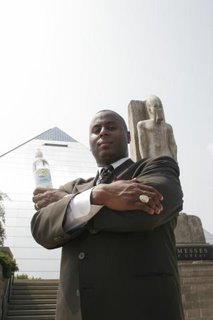
SUCCESS THROUGH SUPPORT: Tedarrell Muhammad says, "We should empower each other and support each other."
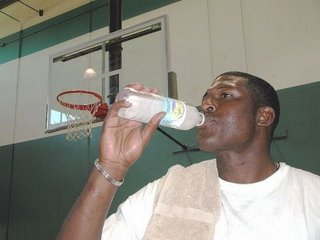
REFRESHING: Larry Johnson having a drink of
Everlasting Spring water.

IN BUSINESS: Tedarrell Muhammad credits former NBA
player Larry Johnson with doing much work to take
Everlasting Spring Water to the next level.
he was able to make it grow to a multi-million dollar operation. He now has warehouses in Memphis, Chicago, and Dallas, and he is looking to soon have plants in Baltimore and California. (He also plans to start distribution here in the St. Louis Area. "I'm looking for people who are willing and able to work to be successful," says Muhammad.)
Muhammad credits his faith in Islam, especially the tenets of the Honorable Elijah Muhammad, with his success, professionally and personally. "I don't take anything for granted anymore. I realize the power of God. Without him, we are nothing; with him, we are everything. I know that if you work for God, he is duly bound to bless you."
Muhammad also views black entrepreneurship and black support as the keys to the advancement of both the black community and of society as a whole. "We should empower each other and support each other. That is what we are here to do: empower ourselves, our families, our people, and then, the world."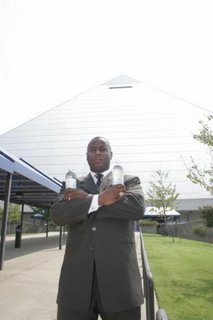
ON TOP: Tedarrell Muhammad has thrived through his
work with Everlasting Spring Water
http://www.everlastingspring.com/
With regard to this holiday season, Muhammad, whose company donated water to a Native American reservation in Louisiana in the aftermath of Hurricane Katrina, says, "We believe in giving all year round. We donate and help people out all year round. I view [the season] mainly as an opportunity to spend time with family."
Andre Anderson also cherishes time with family. Anderson is known for his fashionable wardrobe, his effortless way of making lasting impressions with strangers, and his occasionally ribald sense of humor (which always contains heartfelt advice). Very few people know, however, what this man has been though.
His demeanor had roots in his childhood identity as the class clown. He was always able to draw attention to himself quickly. However, he was soon engaging in drug abuse, which led to criminal activity to feed his habit, which led to incarceration.
At his sentencing, Anderson had a thought that forced him to see the error of his ways. "I thought of my mother being in a casket before I got released. As me and the other guys were getting loaded into the bullpen, I prayed and asked 'Lord, please don't let that happen.'"
From the moment he entered prison, Anderson was a model citizen. The road to making the institution see the method behind his madness was rather difficult: "The facility that I was in did not have anger management or drug rehabilitation programs. I did not want to leave that institution not knowing anything more than I did when I went in, so I wrote grievances to state representatives. I would get a violation and get locked into solitary confinement for 30, 60, 90 days, but I got so many positive responses from the representatives that [the prison staff] had to respect me." Anderson eventually received recognition for doing work to unite prisoners across racial and gang affiliation lines.
Anderson credits his Christian faith for bringing him through his incarceration. "By me realizing that Jesus died in order for me to live, I realized that there was a better way. I started studying and educating myself."
Anderson says that this time of year gives him the opportunity to spend time with his large, loving, extended family. "Even when I was doing wrong, they never turned their back on me. I can't let them know enough how much I appreciate their love." Giving his mother special acknowledgement, he says, "My mother is a women who is strong. When I was chemically dependent, I was not only bringing myself down, I was bringing her down, as well. But when I was out in the streets, she was praying for me. God took all of those prayers and saved me. I give my mother her flowers today, while she's living."
To find more insightful and well written articles from the cultural analyst Mr. Byron Lee a.k.a. Bleebus please check out his official blog @ http://www.bleebus.blogspot.com
Mogul. Part 2 of 2.
To view Part 1 please click here.
A Limelight Exclusive
By Byron Lee
Last month, we profiled two of rap's major power players: Nelly and Jay-Z. This month, we turn the spotlight towards the industry's two most successful and polarizing figures: Sean "Diddy" Combs and Curtis "50 Cent" Jackson.

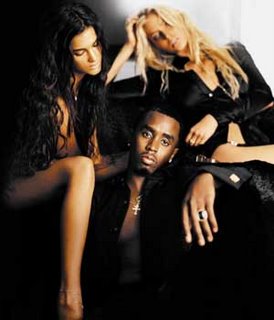
FLAUNTING IT: Diddy styles and profiles in the sun.
No one has taken Russell Simmons's blueprint of brand diversification to more successful heights than Sean Combs, who was recently listed by Fortune Magazine as the most wealthy person in rap. He embarked on his career by dropping out of Howard University and working as an intern at Uptown Records under then President Andre Harrell. The polite, professional Combs worked hard and was eventually, at the age of 19, named Division Director, which put him in a position to develop acts. He would quickly make a name for himself by exposing the public to talented R&B acts with a hip-hop edge, such as Jodeci (which contained K-Ci and JoJo Hailey, who would eventually become a superstar duo on their own) and Mary J. Blige.
The success soon went to Combs's head, and his arrogance alienated his co-workers to the extent that he was fired from Uptown. After sulking in his apartment for a weekend, he plugged his phone back in and found a message from Arista Records. Industry legend Clive Davis was impressed by Combs's work and wanted Combs to operate a new urban music imprint being started through Arista. Combs agreed and christened the imprint "Bad Boy."

THE PERFECT PAIR: Many felt that Combs and Bad Boy flagship artist the Notorious B.I.G. complemented each other perfectly, with the latter being the "Ghetto" to the former's "Fabulous."

LIVE ON STAGE: Regardless of their feelings on his music, people have to admit that Combs knows how to put on a show.
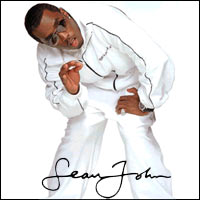
IN STYLE: Comb's "Sean John" clothing line became an instant success, becoming ubiquitous in urban and mainstream fashion outlets.

POWER COUPLE: Sean Combs and Jennifer Lopez provided fodder for urban, fashion, and tabloid journals during their courtship.
While his clothing line got off the ground, his romantic life became more public. Combs struck up a rapport with pop culture hyphenate Jennifer Lopez while the two worked together on the video for Diddy's single "Been Around The World." Soon, the two were inseparable, making headlines with their public appearances at award shows, particularly Jennifer Lopez's iconic green dress at the 2000 Grammys. (It is also rumored that Combs gave Lopez the boost she needed in order to take the step towards a recording career.)
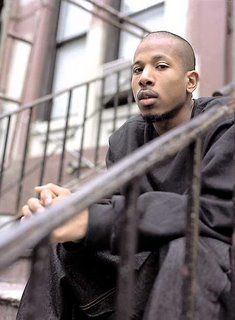 The relationship encountered rocky waters in December of 1999, when a shooting occurred at a nightclub where Diddy, Lopez and then-Bad Boy artist Jamal "Shyne" Barrow were celebrating. The resulting negative publicity (both Combs and Barrow faced charges, while Lopez was not charged) created a fissure that never truly closed. The couple announced their break up on Valentine's Day 2001.
The relationship encountered rocky waters in December of 1999, when a shooting occurred at a nightclub where Diddy, Lopez and then-Bad Boy artist Jamal "Shyne" Barrow were celebrating. The resulting negative publicity (both Combs and Barrow faced charges, while Lopez was not charged) created a fissure that never truly closed. The couple announced their break up on Valentine's Day 2001.

MAKEOVER: Perhaps as an attempt to improve his
post-trial image, Diddy started appearing in public
dressed in the suits from his Sean John line.

ON THEIR OWN: Feeling neglected by Combs, acclaimed R&B quartet 112 eventually started their own independent record label.
The public's perception of Combs is rooted in a concern over how he treats his artists as a whole. Carl Thomas and Black Rob, who were, at one point, two of the most popular artists on the Bad Boy label, went 4 years and 6 years, respectively, without releasing albums. However, when Combs released one of his own albums, the LP seemed to receive all of the attention of Bad Boy's promotions department. 112, another staple of the label's glory years, were so disenchanted with how they were been handled that they tried to leave the label. (Eventually, an agreement was made to split professional interest in the group equally between Bad Boy and Island Def Jam. 112 is now presiding over their own independent label.) Finally, veteran group New Edition, who released their 2004 album "One Love" through Bad Boy, severed ties with the label over Combs's refusal to release a track produced by hitmakers Jimmy Jam and Terry Lewis.

"RAISIN" HIS PROFILE: Combs earned modest reviews for his performance in the revival of "Raisin in the Sun," but simultaneously brought a new audience to the theater.

DOIN' TOO MUCH?: Many people thought that Diddy's "Vote or Die" campaign was awkward and ineffective.
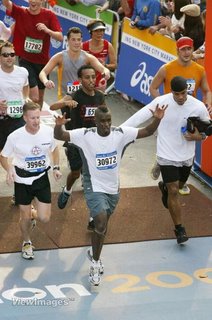
BEST FOOT FORWARD: Diddy finishes the New York
Marathon.
Diddy would soon have an incentive to return to his first love. Bad Boy received a new lease on life last year when Warner Music Group purchased a large minority stake in the label and bought out the remainder of the agreement between Bad Boy and Universal Music Group. New artists such as Cassie (whose "Me and You" has dominated R&B charts), Danity Kane (the multicultural singing group comprised of winners of Diddy's second installment of MTV's "Making The Band") and Atlanta rapper Yung Joc have put the label back on top of the charts. Soon the head honcho will be back in stores when Diddy's new album "Press Play" arrives in mid-October. It seems that, regardless of what people may think of him, Sean Combs cannot be stopped.

2 ON THE WAY: Diddy and girlfriend Kim Porter, with
whom he has one child. The couple recently announced
that they were having twins.
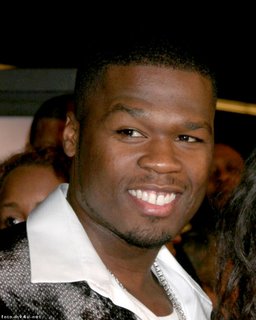
THE NEW SCARFACE?: 50 Cent has often drawn lyrical parallels between his rise to power and that of Tony Montana, Al Pacino's character from the cult film "Scarface."
Another powerful force in the rap industry in recent years has been Curtis "50 Cent" Jackson. Jackson was born in Jamaica, Queens, N.Y. to a drug-dealing single mother. (After his mother was gunned down, he went to live with his grandmother). His mother's friends introduced him to drug running, and a series of plea bargains on drug charges would lead him to stints in both rehab and a military style boot camp. He eventually poured his bravado and his hunger for a better life into rhyme. DJ Jam Master Jay, of the pivotal group Run-DMC, took 50 under his wing and signed him to Columbia Records, where 50 recorded the satirical song "How To Rob," in which the rapper deliberated as to which successful rappers he should rob and how he should go about it. Suffice it to say that many of the real-life rappers mentioned in the song did not find the track to be all that humorous, and the struggling rapper found his name on the lips of many rap heavyweights (Jay-Z famously mentioned 50 on "It's Hot (Some Like It Hot)" from Jay's 4th album "Vol. 3".)
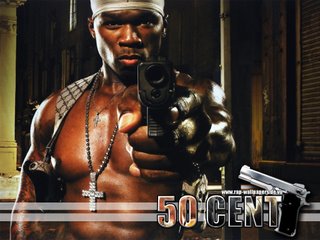
POINT BLANK: This photo, from the album jacket of 50's Shady/Aftermath debut, "Get Rich Or Die Tryin'," made his image perfectly clear.
In 2000, an event would forever change his life. He was shot nine times outside of his grandmother's house by a rival (the rival was murdered several weeks later). Jackson miraculously drove himself to the hospital. While convalescing, he was dropped by his record label.
Struggling to get back to recording, he was aided by producer Sha Money XL, who allowed 50 recording space to make songs for mixtapes (In the rap world, mixtapes are compilations of new songs, or of new freestyles performed over the beats of popular songs, that are released to the streets in order to create, or continue, buzz on a certain artist.). It was during this time that 50 took a major step in building his empire: he recruited rappers who were more skillful than he was, chief among them lyrical monster Lloyd Banks, in order to strengthen his crew.
Learning from his experience in his previous profession, ("Consistency is the key" he said in a 2003 interview with Rolling Stone.) his crew, G-Unit, flooded New York with high quality mixtapes that kept the streets talking. The recordings were bolstered by 50's new gruff, mumbled delivery, a result of a shot he took to the face during the attempt on his life. The buzz became so deafening that it drew the attention of Shady/Aftermath Records, the label run by Dr. Dre and Eminem. The duo flew 50 out to Los Angeles and, impressed with his demeanor, signed him to a recording deal worth 1 million dollars, and gave him his own imprint, G-Unit Records, in order for him to make money off of the artists he brought to the label.
Jackson immediately started securing trademarks for G-Unit, while industry veteran Chris Lighty, who signed on as 50's manager, started looking for endorsement deals. The rapper now has his own shoe deal (through Reebok), his own video game (50 Cent: Bulletproof), his own clothing line (G-Unit), and his own Vitamin Water (Vitamin 50). 50's 2003 Shady/Aftermath debut, "Get Rich Or Die Tryin," sold 6 million copies, bolstered by the irresistible pop anthem "In Da Club," and the public disclosure of what 50 referred to as "street beef" with then-chart reigning pop rapper Ja Rule. Releases from G-Unit members Lloyd Banks and Young Buck appeared shortly thereafter. Furthermore, in what was an inevitable move, 50 appeared in a movie loosely based on his life, "Get Rich or Die Tryin'," last year. While the film did not fulfill expectations at the box office (it was noticeably released in far fewer theaters than Eminem's 2002 flick "8 Mile," the success of which "Get Rich" was clearly patterned to mimic), 50 seems undaunted.
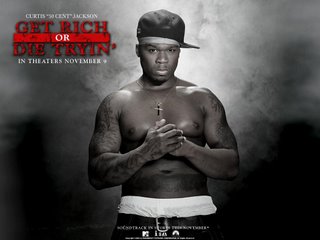
A POOR SHOWING: Plagued by poor distribution, 50 Cent's film debut, "Get Rich or Die Tryin'" failed to find box office fortune.
Perhaps the performance of the film is a sign of declined public interest in Jackson. There seems to be a feeling amongst many that the rapper is overexposed, rimarily due to the products he released in 2005 (his sophomore LP, "The Massacre," the aforementioned film, the soundtrack to said film, and an autobiography, "From Pieces To Weight".)
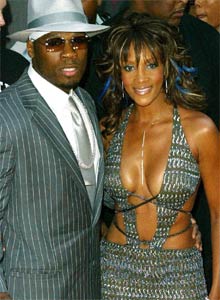
SPLITSVILLE: 50's treatment of Vivica A. Fox after escorting her to the 2003 MTV Video Music Awards made him seem horribly immature.
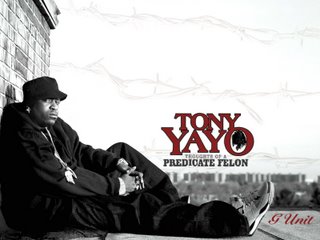
THE BEGINNING OF THE END: Music lovers seem to think that the poor commercial performance of G-Unit albums, such as Tony Yayo's "Thoughts of a Predicate Felon", signal the end of G-Unit's reign on top of the charts.
It seems as if one could set their watch according to his latest publicity stunt. Finally, even though he has a talented stable of performers on his label, few of them could be marketed as superstars. The infectious energy of Tony Yayo couldn't power "Thoughts of a Predicate Felon" to commercial success, and even rap stalwarts Mobb Deep failed to move units with the release of the album "Blood Money."


THE ONE THAT GOT AWAY: Many feel that The Game's dismissal from G-Unit was fueled by 50 Cent's fears that the Game might overshadow him.
Regardless of how many setbacks they face, today's Hip-Hop Moguls will find a way to be triumphant.

ARTISTIC STATEMENT: 50 Cent's back tattoo acknowledges the New York Southside Jamaica Queens area in which he grew up.














